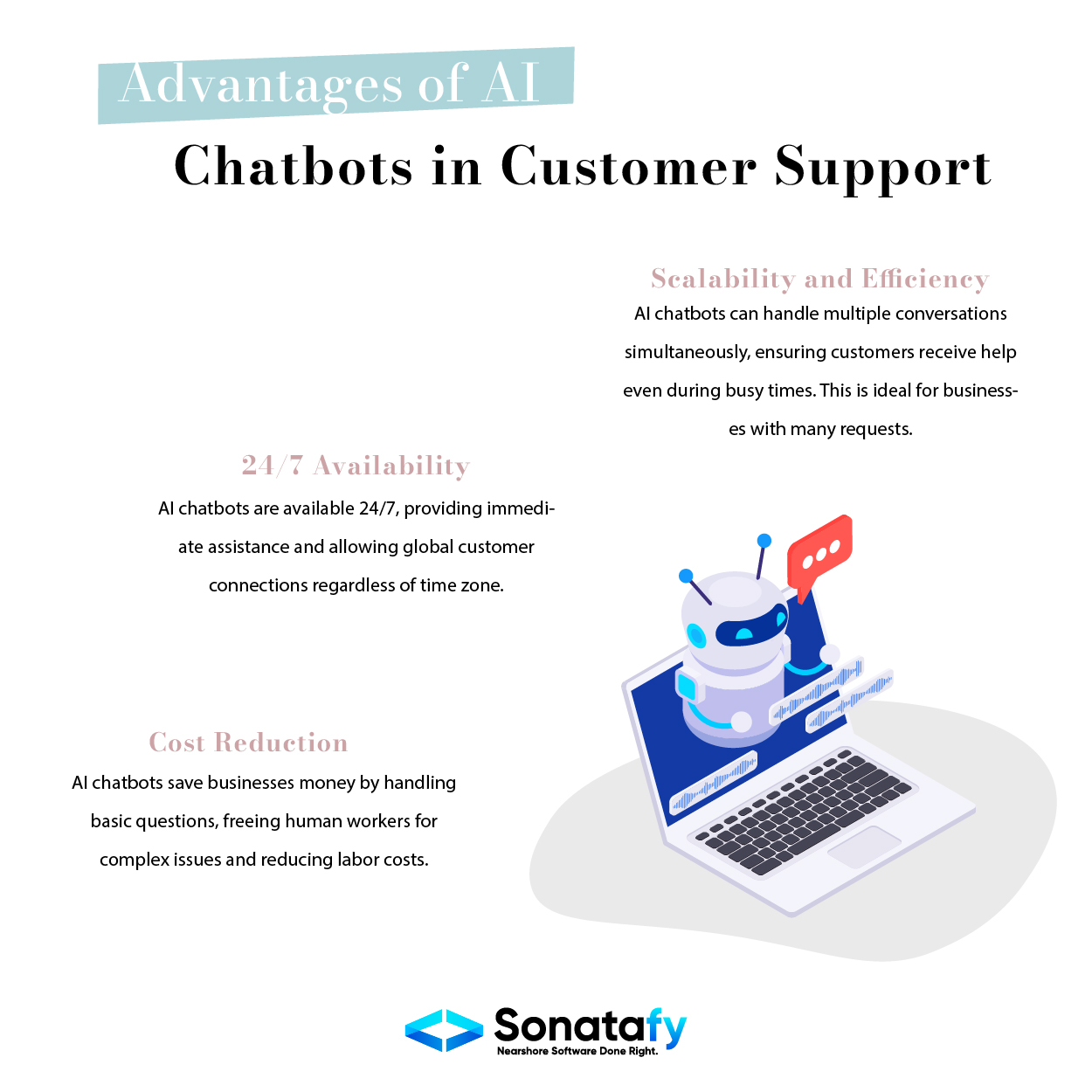Effective customer service is a must for success in agile software development. AI chatbots have completely changed the face of customer service, with customers now demanding speed and efficiency. These smart systems are changing how companies interact with their customers and the dynamics of the software development industry.
What Are AI Chatbots?
AI chatbots are similar to virtual assistants because they use artificial intelligence to understand the questions users ask and provide real conversational feedback. Their capabilities range from providing technical assistance to answering frequently asked questions. Learning from user interactions and improving their responses to make each interaction feel more personal is key to their performance.

24/7 Availability
One of the best things about AI chatbots is they are available 24/7. They don’t need to take breaks like human agents, so you can ask them questions anytime. This means you won’t have to wait for customer service to open when you need help. It’s also perfect for companies that want to connect with customers all over the world, no matter their time zone.
Scalability and Efficiency
AI chatbots can handle multiple conversations at once, which is awesome for businesses that receive many requests. Chatbots can rise up and ensure customers get the help they need, even when things are particularly busy.
Cost Reduction
Using AI-powered chatbots can seriously help businesses save money on customer support. They can address basic questions, freeing humanitarian workers to deal with complex and delicate problems. Companies can reduce labor costs and improve customer service when human interaction is essential.
Integrating AI Chatbots into the Software Development Industry
Integration with Existing Systems
AI chatbots are absolutely essential for customer service processes in software development organizations. Chatbots provide customers a consistent service experience by seamlessly integrating social media sites, mobile apps, websites, and other platforms. This connection usually involves APIs and webhooks that link the chatbot with CRM systems, databases, and other backend services. This makes it possible to access data in real-time and communicate with customers.
Customization and Personalization
Customization is a key factor that can significantly impact the use of AI chatbots in software development. Developers can ensure that chatbots are best suited to handle questions about their business by programming them to understand the industry-specific language associated with their products or services. For conversations to be appropriate to deliver a complete experience, AI chatbots can also use customer data, such as past interactions and purchase history, to boost customer satisfaction.
Continuous Learning and Improvement
Chatbots are operated by AI models that learn from user interactions. This is super important because new updates and technologies are always coming up. With continuous learning, chatbots can stay on top of the latest information and troubleshooting methods, ensuring they provide us with the best possible service.
Challenges and Considerations
Using AI chatbots has benefits, but it also brings some challenges. One of the biggest challenges is designing and training a chatbot, which takes time and resources to function correctly. Balancing automated conversations and human interactions is essential because some customers might want to talk to a real agent for complex issues.
Keeping customer information safe and private when using chatbots is super important. They can handle sensitive stuff, so ensuring they’re secure and follow data regulations will keep customer interactions trustworthy and legit.
Future Trends Influenced by AI Chatbots
Increasing Integration with Emerging Technologies
AI chatbots are getting brighter daily thanks to new technologies like machine learning, natural language processing, and blockchain. These updates are turning chatbots into more than just simple Q&A systems. They can now solve complex problems, predict outcomes, and make decisions automatically. Chatbots are becoming more important in software development, and we expect to see them increasingly used in business intelligence systems.
Enhanced Personalization Through AI
As AI technologies get better, so do chatbots. They can now provide super personalized experiences. Future chatbots will be able to understand human emotions, interests, and behaviors, making interactions with them even more exciting and personalized. This could make our interactions with chatbots more fun.
Ethical AI and Transparency
As AI chatbots grow, ethical accountability and transparency are essential. Developers use fair and unbiased algorithms to create an ethical AI model. People are also interested in knowing how the chatbots handle their personal data. It’s vital to ensure these chatbots are transparent and ethical so people can trust them and feel confident that their data is protected.
Preparing for an AI-driven customer Support Environment
Developing Robust AI Strategies
It’s super crucial for software development businesses to have a solid AI strategy in place. It’s more than picking the right tech and platforms for chatbot building and integration. You also need to have clear goals for what your chatbots should accomplish. Are you trying to speed up response times, get customers more involved, or save on costs? Whatever it is, having a solid strategy will help you make sure your chatbots work well and keep getting better.
Training and Development
Chatbots need to be trained and developed to work to their full potential. IT professionals are not the only ones who need to know this information; customer service staff must also be notified. The training program should help people get comfortable using chatbots, teach them how to handle customers during conversations, and ensure a simple shift from chatbots to humans.
Continuous Monitoring and Evaluation
Monitoring how AI chatbots perform is really important. By comparing their performance against established goals (known as KPIs), you can identify areas for improvement. This helps fine-tune AI systems to customer expectations or behavior changes to better meet customer requirements.
Conclusion
Chatbots with artificial intelligence (AI) are revolutionizing the software development industry’s customer support. They provide effective, flexible, and customized client service. In the future, with the advancement of AI technology and its integration with other technologies, AI-powered chatbots are likely to play a larger role in the industry. Through further development, training, and evaluation of these chatbots, customer support services performance and overall company results and output on their ability to fully utilize to improve. AI chatbots will improve as technology evolves, making them essential to innovative customer service strategies in software development.




